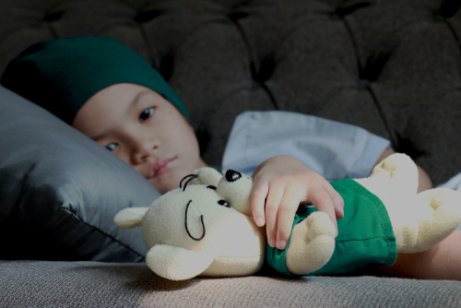What Is Palliative Care for Children

Palliative care is for children who are facing terminal illnesses and need a great deal of care and support. It’s a set of actions that are aimed at relieving discomfort and improving their quality of life as much as possible. This involves covering both suffering children’s physical needs as well as their emotional needs.
When a child’s life is at risk, it’s crucial that parents are well-informed about the different stages, needs, situations and ways to act. That’s why it’s very important to involve the help of a trusted and prepared psychological therapist. This will help patients as well as their loved ones on a daily basis.
Palliative care is offered to children with an unfavorable prognosis of life and who have limited or no response to treatment.

Characteristics of palliative care
The basic pillars of palliative care are: controlling symptoms, effective communication, psycho-emotional support, and tending to the family.
- Affection.
- Respect.
- Empathy.
- Solidarity.
- Continuous attention.
- Flexibility and adaptability.
- Constant medical supervision.
In accordance with these characteristics, palliative care for children is aimed at providing personalized care. The goal of this care is to improve children’s well-being as much as possible.
On an emotional level, the most important aspect is to make sure children feel loved and valued. At the same time, they need to see that their family is united.
Palliative care is part of the most sensitive and humane branch of medicine. It consists of alleviating symptoms, preventing discomfort and improving a patient’s quality of life.
The principles of palliative care
- Providing relief for pain and other symptoms.
- Giving support to families so they can face the illness.
- Loving life and accepting death as a natural process.
- Helping patients get involved in psychosocial and spiritual aspects.
- Allowing death to occur when it’s time, rather than delaying it or speeding it up.
- Some care centers have systems that help children live as actively as possible.
How do caregivers provide support to children and family?
In order for palliative care to be successful, professional staff need to be sure to create a direct line of communication with patients and families.
There needs to be an environment of respect, consideration, trust, and cordiality. There also needs to be a clear understanding of the objectives and the state of the child’s illness. Everyone’s desires must also be made clear, especially those of the patient.

Palliative care is applied according to each child’s age and circumstances.
Personalized care, in stages of assimilation
Patients under the age of 18 months don’t have the capacity to comprehend illness. Therefore, they face it as physical pain and anguish. In these cases, the professional concentrates on managing symptoms. Family members remain present with the child continuously.
Between the ages of 18 months and 5 years, children develop a sense of recent time, but not of the future. Therefore, they comprehend death as going away or falling asleep, with the possibility of coming back or waking up.
At age 5, children begin to suffer greatly the isolation that comes with illness. This not only has to do with being separated from family members, but also friends, favorite places, etc. As a result, they feel insecure and start to see their illness as the enemy that constantly harms them.
After the age of 10 and throughout adolescence, children are more aware of the irreversibility of death. They may view their illness with anger because of the resulting isolation and personal limitations that it produces.
Pediatric palliative care adapts surgeries and possible treatments to the stage that children are in. The same is true regarding changes that children must face.
It’s important for caregivers to be tactful, but this doesn’t mean evading or denying reality. Understanding is a fundamental part of acceptance during this distinct stage.
Family members have a difficult task before them. This includes helping their children understand that palliative care allows them to face death in the most humane and dignified way possible.
In this sense, doctors and psychologists provide us with the tools we’ll need along the way. They also offer families the support they need as they mourn and follow up with family members after the loss of their loved one.
Palliative care is for children who are facing terminal illnesses and need a great deal of care and support. It’s a set of actions that are aimed at relieving discomfort and improving their quality of life as much as possible. This involves covering both suffering children’s physical needs as well as their emotional needs.
When a child’s life is at risk, it’s crucial that parents are well-informed about the different stages, needs, situations and ways to act. That’s why it’s very important to involve the help of a trusted and prepared psychological therapist. This will help patients as well as their loved ones on a daily basis.
Palliative care is offered to children with an unfavorable prognosis of life and who have limited or no response to treatment.

Characteristics of palliative care
The basic pillars of palliative care are: controlling symptoms, effective communication, psycho-emotional support, and tending to the family.
- Affection.
- Respect.
- Empathy.
- Solidarity.
- Continuous attention.
- Flexibility and adaptability.
- Constant medical supervision.
In accordance with these characteristics, palliative care for children is aimed at providing personalized care. The goal of this care is to improve children’s well-being as much as possible.
On an emotional level, the most important aspect is to make sure children feel loved and valued. At the same time, they need to see that their family is united.
Palliative care is part of the most sensitive and humane branch of medicine. It consists of alleviating symptoms, preventing discomfort and improving a patient’s quality of life.
The principles of palliative care
- Providing relief for pain and other symptoms.
- Giving support to families so they can face the illness.
- Loving life and accepting death as a natural process.
- Helping patients get involved in psychosocial and spiritual aspects.
- Allowing death to occur when it’s time, rather than delaying it or speeding it up.
- Some care centers have systems that help children live as actively as possible.
How do caregivers provide support to children and family?
In order for palliative care to be successful, professional staff need to be sure to create a direct line of communication with patients and families.
There needs to be an environment of respect, consideration, trust, and cordiality. There also needs to be a clear understanding of the objectives and the state of the child’s illness. Everyone’s desires must also be made clear, especially those of the patient.

Palliative care is applied according to each child’s age and circumstances.
Personalized care, in stages of assimilation
Patients under the age of 18 months don’t have the capacity to comprehend illness. Therefore, they face it as physical pain and anguish. In these cases, the professional concentrates on managing symptoms. Family members remain present with the child continuously.
Between the ages of 18 months and 5 years, children develop a sense of recent time, but not of the future. Therefore, they comprehend death as going away or falling asleep, with the possibility of coming back or waking up.
At age 5, children begin to suffer greatly the isolation that comes with illness. This not only has to do with being separated from family members, but also friends, favorite places, etc. As a result, they feel insecure and start to see their illness as the enemy that constantly harms them.
After the age of 10 and throughout adolescence, children are more aware of the irreversibility of death. They may view their illness with anger because of the resulting isolation and personal limitations that it produces.
Pediatric palliative care adapts surgeries and possible treatments to the stage that children are in. The same is true regarding changes that children must face.
It’s important for caregivers to be tactful, but this doesn’t mean evading or denying reality. Understanding is a fundamental part of acceptance during this distinct stage.
Family members have a difficult task before them. This includes helping their children understand that palliative care allows them to face death in the most humane and dignified way possible.
In this sense, doctors and psychologists provide us with the tools we’ll need along the way. They also offer families the support they need as they mourn and follow up with family members after the loss of their loved one.
All cited sources were thoroughly reviewed by our team to ensure their quality, reliability, currency, and validity. The bibliography of this article was considered reliable and of academic or scientific accuracy.
- Arrambide, M. S., Poc, O. G., Miravete, J. M., Pérez-Yarza, E. G., & Caro, I. A. (2004, January). Los cuidados paliativos: un modelo de atención integral al niño gravemente enfermo ya su familia. In Anales de pediatría (Vol. 61, No. 4, pp. 330-335). Elsevier Doyma. https://www.sciencedirect.com/science/article/abs/pii/S1695403304783976
- Álvarez Silvan, A. M. (2009). Cuidados paliativos en los niños con cáncer. Cuadernos de Bioética, 20(70), 545-547. http://aebioetica.org/rtf/36-BIOETICA-70.pdf
- del Rincón, C., Martino, R., Catá, E., & Montalvo, G. (2008). CUIDADOS PALIATIVOS PEDIÁTRICOS. EL AFRONTAMIENTO DE LA MUERTE EN EL NIÑO ONCOLÓGICO. Psicooncología, 5. https://www.researchgate.net/profile/Ricardo-Martino/publication/27595707_Cuidados_paliativos_pediatricos_el_afrontamiento_de_la_muerte_en_el_nino_oncologico/links/54b81b8f0cf28faced6203b1/Cuidados-paliativos-pediatricos-el-afrontamiento-de-la-muerte-en-el-nino-oncologico.pdf
This text is provided for informational purposes only and does not replace consultation with a professional. If in doubt, consult your specialist.








